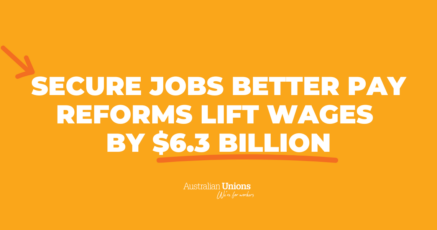Aware Super
Women face a substantial deficit in their super at retirement compared with men, and the gender pay gap is just part of the problem, a study has found.
Australia’s gender pay gap is among factors that will leave women with a $93,0000 superannuation shortfall at retirement compared with men, according to new research.
Modelling by Aware Super, one of Australia’s largest super funds, indicates that at 13 per cent, the national gender pay gap is a key factor contributing to the wide divergence in retirement balances.
The research comes as the fund releases its inaugural Hold the Door report, highlighting how unconscious bias contributes to the super gap.
It names five significant life stages and touchpoints when unconscious bias acts as a “closed door” for women, exacerbating gender inequality.
They are: the education years; career selection; the pay gap; caring responsibilities; and missed opportunities.
The fund, which has around 700,000 women among its 1.1 million members, is calling for community-wide action to help overcome the impact of unconscious bias in these areas.
Aware Super CEO Deanne Stewart, a Pay Equity Ambassador for the Workplace Gender Equality Agency (WGEA), said the report would help Australian women, their partners and employers understand the direct relationship between the “five closed doors” and gender super gap at retirement.
“Equal pay for women and men has been a legal requirement in Australia since 1969,” Ms Stewart said. “In reality though, as Hold the Door shows us, the persistent gender pay gap – and subsequent gap at retirement – is as much about how we educate our young people, how we help teenagers plan for their future careers, and how we support employees with caring responsibilities, as it is about rates of pay.”
“In 2023 we need to recognise that these persistent gaps based on gender aren’t about a silent conspiracy to underpay women so much as an insidious, unconscious bias in the way we build and maintain our education and employment systems.”
“Unless we actively take steps to account for these unconscious biases, they are destined to continue, and further entrench the disadvantages experienced by Australian women at work, at home, and in retirement.”
The Health Services Union, Police Association of NSW, Australian Education Union Victorian Branch, and the Community and Public Sector Union, SPSF Victorian Branch all contributed to the report.
Aware Super released the report on August 25, which was Equal Pay Day for 2023, marking the 56 extra days into the new financial year Australian women needed to work to earn the same on average as men did in the past financial year.
The fund’s modelling on the super pay gap accounts for the impact of factors such as missing out on super during time away from work to have children, and working part-time work after having children.
Ms Stewart said leaders in business and government needed to take practical options, “holding open a door that was previously closed to girls and women, and making sure we’re tackling unconscious bias through real actions that make a real difference”.
Based on the 13 per cent gender pay gap, Aware Super says a woman working a typical 9am-5pm day is effectively working for free after 3.57pm – a time it calls Pay Gap O’Clock.





SHARE:
Mind the gap: Why unconscious bias costs Australian women dearly in retirement